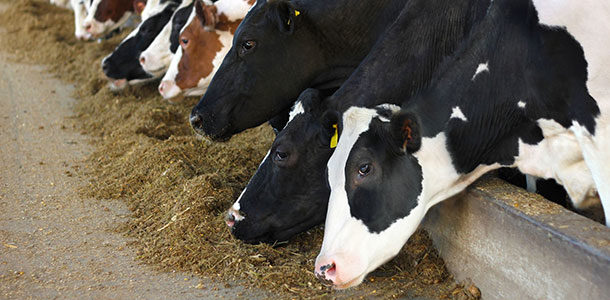The bacterium Escherichia coli is among the most troublesome pathogens in the context of food safety, and a Colorado State University veterinary team hopes to help mitigate its spread on dairy farms by investigating microbial dynamics in the dairy-cow gut.
The two scientists think their research could lead to strategies to stanch E. coli shedding at dairies and reduce contamination in the human food chain.
Dr. Craig McConnel, a Colorado State University veterinarian and assistant professor of dairy population health management, and CSU graduate student Chloe Stenkamp-Strahm recently won second place in the international MO BIO Microbiome Awards to pursue their project.
The competition, sponsored by MO BIO Laboratories, grants “young, extraordinary scientists” $3,000 – plus extensive laboratory DNA extraction and sequencing analysis – for work in microbiome research. The burgeoning field examines the ecology of microorganisms and associated impacts on health and disease.
McConnel and Stenkamp-Strahm intend to use the sponsored testing, scheduled at the Earth Microbiome Project at the Argonne National Laboratory, for deep genetic sequencing of nearly 400 project samples to study how other intestinal flora influence or promote the growth of E. coli.

“The thing that makes this different from other microbiome projects is the type and the depth of sequencing we want to do,” said Stenkamp-Strahm, who is enrolled in a College of Veterinary Medicine and Biomedical Sciences program that simultaneously awards a DVM and Ph.D.
She and McConnel think examining bacterial communities in the lower gastrointestinal tracts of dairy cattle will yield tangible applications. Their research is titled, “Determining Microbial Community Impacts on the Colonization and Shedding of E. coli O157:H7 in Lactating Dairy Cattle.”
“People have been investigating different feeds to try, or probiotics, or making new vaccines, yet we don’t know the bacterial components of the lower GI that directly play into E. coli shedding,” Stenkamp-Strahm said. “If we sequence to the point where we can actually see all of those species, and realize those that are common or uncommon to a shedding cow, we can then actually tie that to the development of interventions.”
Microbiome research is attracting attention as scientists increasingly understand the role of microorganisms in individual and public health, said Sandrine Miller, sales and marketing director for MO BIO Laboratories, based in Carlsbad, California.
“We wanted to bring more support to young scientists who want to participate in this hot topic,” Miller said of the first research contest. McConnel and Stenkamp-Strahm were among just three winning teams. PD
—From Colorado State University news release
PHOTOS
PHOTO 2: Chloe Stenkamp-Strahm, graduate student, and Dr. Craig McConnel, CSU dairy veterinarian, hope to discover whether communities of microorganisms in the dairy-cow gut could influence E. coli shedding at dairies. Photos provided by Colorado State University.





